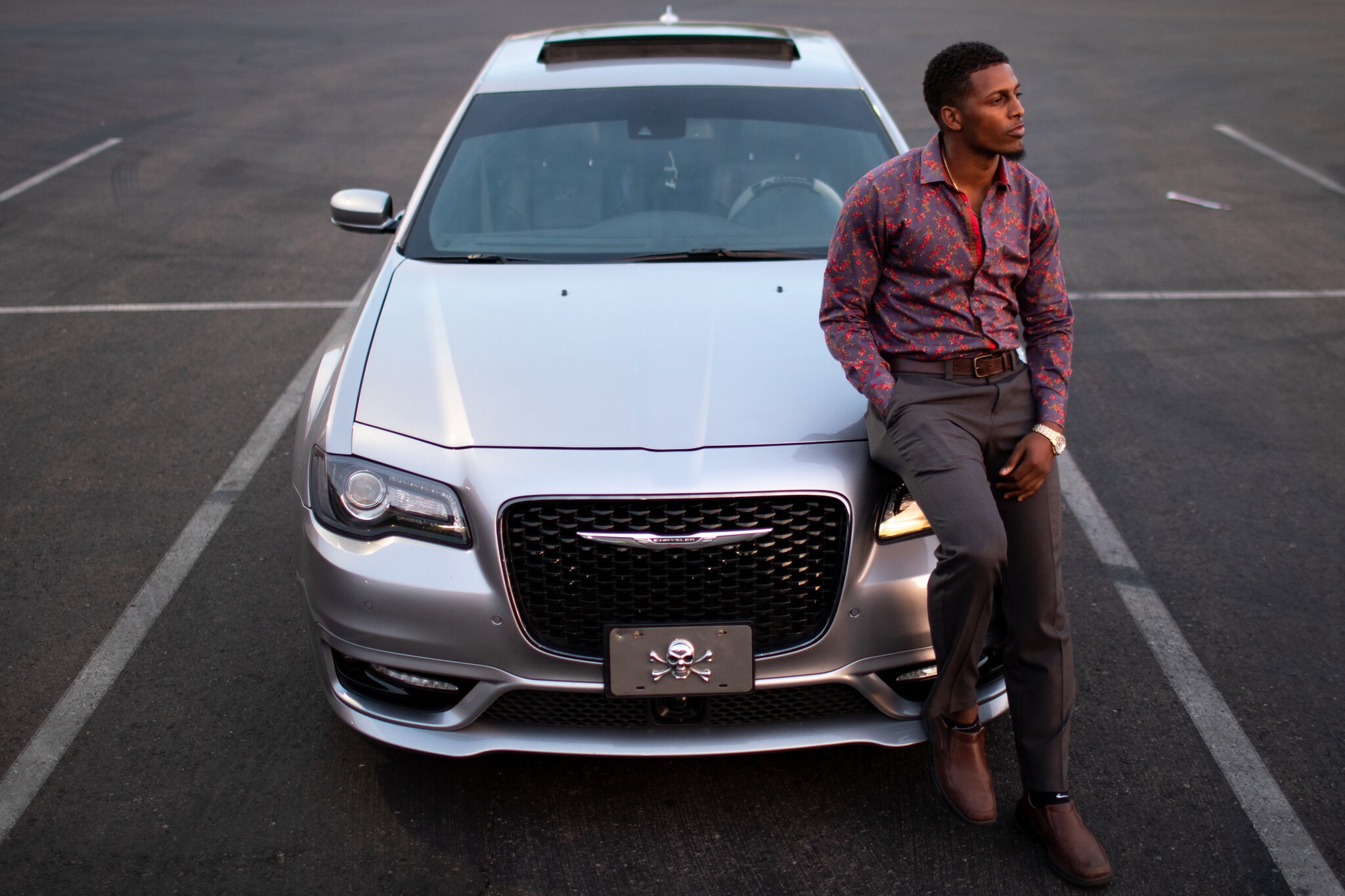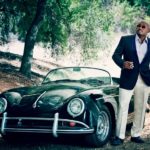
Air Freshners & Traffic Stops
- April 22, 2021
- by
- Lisa Mei
How a Common Air Freshener Can Result in a High-Stakes Traffic Stop
A majority of states have laws making it illegal to hang anything from a rearview mirror that obscures a driver’s view. But critics say the laws are often used as pretexts.

Mike Baker and
Phil Colbert was on his way to meet his father for lunch before his shift at an Arizona auto dealership in 2019 when he saw the flashing lights of a sheriff’s patrol car in his mirror. He made sure his hands were on the steering wheel, planted at 10 and 2 as his parents had taught him, and asked why he had been stopped.
“You can’t have anything hanging from your rearview mirror,” the La Paz County deputy, wearing a Blue Lives Matter wristband, told him.
The officer was referring to the tree-shaped air freshener dangling near the windshield but quickly moved on to other questions: Do you have any marijuana? Do you smoke marijuana? When was the last time you did smoke marijuana? Do you have any cocaine? To Mr. Colbert, who is Black, the air freshener seemed nothing more than a pretext for the driving equivalent of a stop-and-frisk.
“At that point, I was like, ‘This dude is coming up with anything. He’s just coming up with anything to talk to me or mess with me,’” said Mr. Colbert, 23, who recorded the traffic stop on his cellphone and ultimately was let off with a warning
The air fresheners that dangle from rearview mirrors have been a ubiquitous accessory in cars for decades. But they may be treated as illegal in a majority of states, which have laws prohibiting objects near the windshield that can obstruct motorists’ views. They are part of a suite of low-level offenses, such as tinted windows or broken taillights, that civil rights advocates complain have become common pretexts for traffic stops that too often selectively target people of color.
The encounter this week in Minnesota that led to a police officer fatally shooting Daunte Wright, a 20-year-old Black man, began when officers initiated a traffic stop and raised the issue of a hanging air freshener, according to Mr. Wright’s mother, who talked to her son on the telephone moments before he was shot.
Pete Orput, the Washington County attorney, said officers had noticed an expired registration tab on Mr. Wright’s license plate and decided to pull his car over. One of the officers later noted the air freshener hanging from the mirror, which was a violation of the law, Mr. Orput said.


Racial bias in traffic stops has been a focus of researchers and civil rights advocates for years. At Stanford University’s Open Policing Project, researchers analyzing more than 100 million traffic stops around the country found persistent racial disparities, with Black drivers more likely to be stopped and both Black and Hispanic drivers more likely to be searched. The researchers found that officers needed less suspicion to decide to search Black and Hispanic drivers.
Traffic stops also have the potential to escalate, like the case of Mr. Wright, who was shot by a police officer after he got back into his car as the police tried to arrest him for an unrelated warrant. The officer, Kimberly A. Potter, who had shouted that she was preparing to use her Taser, resigned and was charged with second-degree manslaughter.
Paige Fernandez, a policing policy advocate at the American Civil Liberties Union, said low-level infractions such as expired registrations and air fresheners on mirrors should not be handled by armed police officers.
“The danger that police traffic stops pose greatly outweighs any benefit of having them engage in that,” Ms. Fernandez said.
Mayor Mike Elliott of Brooklyn Center, Minn., where Mr. Wright was killed, said police officers should not be pulling people over because of an expired registration during the coronavirus pandemic.
The prohibitions against objects hanging from rearview mirrors can extend to fuzzy dice, graduation tassels and rosaries. Last year, amid the pandemic, authorities in Maine warned against hanging masks.
A woman who answered the phone for the manufacturer of one of the most common hanging air fresheners, Little Trees, said the company would have no comment on the legal debate. The company’s website shows the scented paper trees hanging from a rearview mirror.
States have long grappled with how to best handle the obstruction issue. After court data showed more than 1,400 citations in one year for people driving on Maryland highways with windshields obstructed by objects or materials, the state changed its law in 2017. The violation is no longer a primary offense, which would justify a traffic stop, but a secondary offense, which can only be cited after a motorist has been pulled over for something more serious, such as speeding.
Virginia has followed suit as part of a broader package of reforms limiting when the police can conduct traffic stops.
Dana Schrad, the executive director of the Virginia Association of Chiefs of Police, said the group had supported some of the changes, including a prohibition on stopping people for recently expired registrations. When lawmakers changed the law to require that a driver’s view must be “substantially” obstructed by objects to be considered a violation, police agencies did not object.
Making windshield obstructions a secondary offense could allow some motorists to continue driving even with substantial obstruction that limits their view. Ms. Schrad said that had raised concern that roads could become less safe.
Ms. Schrad said that when officers stop people for minor violations, they can also discover other issues, including outstanding felony warrants or evidence of other crimes. “The more you limit the ability of a law enforcement officer to intervene in something that would be a violation of the law, you limit their ability to discover other criminal activity,” she said.
In places where air fresheners have been treated as a primary offense, the traffic stops have faced legal challenges with various outcomes.


On an April evening in 2008, Benjamin Garcia-Garcia was driving a minivan along Interstate 55 near Springfield, Ill., when a state trooper who had been parked in the median moved onto the freeway and pulled him over. According to court records, the trooper claimed he had seen the pink air freshener hanging from Mr. Garcia-Garcia’s mirror and believed it violated the state statute prohibiting objects that could obstruct the driver’s view.
The trooper later conceded that he did not stop every car with an air freshener and had not observed any other traffic violations. The trooper issued a written warning, but in the process he also learned that Mr. Garcia-Garcia and his passengers were in the country illegally. That triggered a response from Immigration and Customs Enforcement that resulted in Mr. Garcia-Garcia facing a federal charge of crossing the border illegally. He was imprisoned and deported.
Mr. Garcia-Garcia challenged the justification for the stop as part of his criminal case, arguing that the trooper could not have seen the air freshener on a vehicle going at highway speeds and that he could not have concluded it was a material obstruction. The U.S. Court of Appeals for the Seventh Circuit rejected the argument.
“The object the trooper observed was small, but given its size and position relative to the driver, a reasonable officer could conclude that it violated the Illinois statute prohibiting material obstructions,” the judges wrote.
In a more recent case, on the South Side of Chicago, a police officer reported seeing an air freshener in a vehicle and began following the car, then stopped it for violating a municipal code provision prohibiting windshield obstructions. During the traffic stop, officers found guns in the vehicle and arrested the two men inside, who were Black. The men challenged the legality of the traffic stop, but the same appeals court once again held that the stop was constitutional.
But in Connecticut in 2010, after a traffic stop in which a driver had a chain and cross dangling from his rearview mirror, the State Supreme Court sided with the driver, determining that the object was relatively small and that the trooper who initiated the stop did not articulate any concern that the object was blocking the driver’s view.


The case of Mr. Colbert, the motorist stopped in Arizona in an unincorporated area between Parker and Lake Havasu, became public after he posted video of the traffic stop online. He later got a lawyer, Benjamin Taylor, who said he believed that the deputy engaged in racial profiling.
“Even if you are polite, calm, even college-educated, the bottom line is that at the end of the day you are still Black,” Mr. Taylor said. “That’s all the cop sees and stereotypes.”
The Sheriff’s Department later determined that the deputy had no legitimate basis for his repeated questioning of Mr. Colbert. The deputy, Eli Max, was fired in part for his handling of the stop. Mr. Colbert took steps to pursue a lawsuit but settled with the county before it got that far, Mr. Taylor said.
Even for those who are ultimately let go with a warning, being pulled over for a rearview mirror infraction can have a lasting effect. In Galesburg, Ill., Brittany Mixon was a senior in high school when she was pulled over by a police officer in 2003, ostensibly because of the air freshener hanging from her mirror. But when the officer approached the car, she said, his first question was about whether the Toyota Corolla she was driving was hers.
“He kept asking me questions like he wanted to trip me up,” said Ms. Mixon, who is Black.
Even now, at 35, she makes sure not to have anything hanging from her mirror — or from the mirror of a car she is riding in — because she does not want to risk getting pulled over.
“If I get in a car with somebody and they have something hanging from their mirror, I’m like, ‘Can you take that down?’” Ms. Mixon said. “Being a Black passenger might trigger something in a racist cop, so let’s just remove that altogether from the situation.”
An earlier version of this article described incorrectly a conclusion from the Open Policing Project regarding racial bias in traffic stops. Data shows that Hispanic drivers are stopped at similar or lower rates as white drivers; they are not more likely to be stopped.
Mike Baker is the Seattle bureau chief, reporting primarily from the Northwest and Alaska. @ByMikeBaker
Nicholas Bogel-Burroughs reports on national news. He is from upstate New York and previously reported in Baltimore, Albany, and Isla Vista, Calif. @nickatnews










